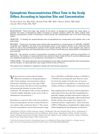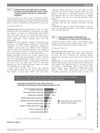 5 citations,
January 2014 in “Current Dermatology Reports”
5 citations,
January 2014 in “Current Dermatology Reports” Many adult women suffer from persistent or late-onset acne, and while various treatments exist, finding the right one can be challenging.
 5 citations,
May 2008 in “Pediatric Diabetes”
5 citations,
May 2008 in “Pediatric Diabetes” Low-glycemic index diets are beneficial for weight loss and satiety, but more research is needed on long-term effects and individualized approaches are recommended.
 4 citations,
July 2016 in “Dermatologic Surgery”
4 citations,
July 2016 in “Dermatologic Surgery” Higher epinephrine concentration and specific injection sites increase scalp vasoconstriction time.
 4 citations,
February 2016 in “Clinical Pharmacology & Therapeutics”
4 citations,
February 2016 in “Clinical Pharmacology & Therapeutics” Hair follicle samples effectively show how well the drug MK-0752 targets and engages with the Notch pathway.
 4 citations,
January 2016 in “Annals of Dermatology”
4 citations,
January 2016 in “Annals of Dermatology” More severe hair loss links to thicker heart fat, suggesting possible heart disease risk.
 4 citations,
January 2016 in “International journal of reproduction, contraception, obstetrics and gynecology”
4 citations,
January 2016 in “International journal of reproduction, contraception, obstetrics and gynecology” A certain genetic variation is linked to a higher risk of polycystic ovarian syndrome.
 3 citations,
June 2023 in “Frontiers in medicine”
3 citations,
June 2023 in “Frontiers in medicine” Oxidative stress may contribute to hair loss in alopecia areata and antioxidants could potentially help as a treatment.
 3 citations,
January 2023 in “Physiological Research”
3 citations,
January 2023 in “Physiological Research” Conditioned media from mesenchymal stem cells show promise for tissue repair and disease treatment, but more research is needed on their safety and effectiveness.
 3 citations,
February 2018 in “Journal of evolution of medical and dental sciences”
3 citations,
February 2018 in “Journal of evolution of medical and dental sciences” Some ovarian tumors can cause masculinization, and it's important to check for various causes when this symptom is present.

SLE significantly affects daily life, especially through fatigue and joint pain, highlighting the need for better treatments.
 3 citations,
March 2014 in “Annals of Hepatology”
3 citations,
March 2014 in “Annals of Hepatology” A man lost all his hair after stopping hepatitis C treatment and it didn't grow back.
 3 citations,
October 2011 in “QJM”
3 citations,
October 2011 in “QJM” The drugs finasteride and dutasteride reduce low-grade prostate cancers but may double the risk of high-grade cancers.
 3 citations,
January 2010 in “Expert Opinion on Pharmacotherapy”
3 citations,
January 2010 in “Expert Opinion on Pharmacotherapy” No treatment fully stops excessive hair growth in women, but various methods can help manage it effectively.
 2 citations,
June 2022 in “International Journal of Biomedicine”
2 citations,
June 2022 in “International Journal of Biomedicine” The review suggests a comprehensive approach to treat hirsutism, focusing on hair removal, medication, and managing emotional effects.
 2 citations,
January 2019 in “Springer eBooks”
2 citations,
January 2019 in “Springer eBooks” The conclusion is that different blood diseases cause specific oral symptoms and require varied treatments to manage these symptoms and improve patient health.
 2 citations,
January 2015 in “Springer eBooks”
2 citations,
January 2015 in “Springer eBooks” Early diagnosis and aggressive treatment are crucial for Cicatricial Alopecia, and treatment effectiveness varies among patients.
 2 citations,
January 2014 in “Springer eBooks”
2 citations,
January 2014 in “Springer eBooks” Polycystic Ovary Syndrome (PCOS) often leads to severe acne, and lifestyle changes and hormonal treatments can help manage it.
 2 citations,
April 2013 in “Expert Review of Endocrinology & Metabolism”
2 citations,
April 2013 in “Expert Review of Endocrinology & Metabolism” Identifying nonclassic congenital adrenal hyperplasia and carriers of CYP21 mutations is challenging, and genetic counseling is recommended due to their prevalence.
 1 citations,
January 2020 in “International journal of research in pharmacy and chemistry”
1 citations,
January 2020 in “International journal of research in pharmacy and chemistry” Eclipta alba has many health benefits and potential for medical and nutritional use.
 1 citations,
April 2016 in “Journal of Reproductive Health and Medicine”
1 citations,
April 2016 in “Journal of Reproductive Health and Medicine” Diagnosing new systemic lupus during pregnancy is hard but important for the health of the mother and baby.
 1 citations,
December 2015 in “Journal of the Medical Sciences (Berkala Ilmu Kedokteran)”
1 citations,
December 2015 in “Journal of the Medical Sciences (Berkala Ilmu Kedokteran)” Transplanting melanocyte stem cells from hair follicles can effectively treat vitiligo.
 1 citations,
January 2014 in “Springer eBooks”
1 citations,
January 2014 in “Springer eBooks” Adult acne is more common in women, often linked to hormones, and can be harder to treat.
 1 citations,
June 2012 in “Actas Dermo-Sifiliográficas”
1 citations,
June 2012 in “Actas Dermo-Sifiliográficas” Early and aggressive treatment of scarring alopecia is important to prevent further hair follicle damage.
 1 citations,
March 2011 in “Infertility”
1 citations,
March 2011 in “Infertility” Hormone imbalances from the pituitary, thyroid, and adrenal glands can cause infertility, but treating these disorders can improve fertility.
 1 citations,
January 2010 in “Serbian Journal of Dermatology and Venereology”
1 citations,
January 2010 in “Serbian Journal of Dermatology and Venereology” The document concludes that effective acne treatment requires a personalized combination of therapies and long-term commitment, with retinoids being important for maintenance.
 1 citations,
April 2006 in “Seminars in Reproductive Medicine”
1 citations,
April 2006 in “Seminars in Reproductive Medicine” Androgen therapy might help some women with low libido, but it has risks and should be used carefully.
 1 citations,
January 2006
1 citations,
January 2006 Hirsutism is mainly caused by high androgen levels or sensitivity, with PCOS being the most common cause.
 1 citations,
November 1996 in “Journal of Cutaneous Medicine and Surgery”
1 citations,
November 1996 in “Journal of Cutaneous Medicine and Surgery” Hormones, especially androgens, play a key role in causing acne, and treatments like hormone control pills and hormone-blocking medications can help.
 1 citations,
February 1994 in “Drug Investigation”
1 citations,
February 1994 in “Drug Investigation” Sulfasalazine might cause hair loss, especially in women, and stopping it can reverse the hair loss.
 August 2024 in “OSMANGAZİ JOURNAL OF MEDICINE”
August 2024 in “OSMANGAZİ JOURNAL OF MEDICINE” The visfatin GT genotype may increase the risk of Alopecia Areata.






























